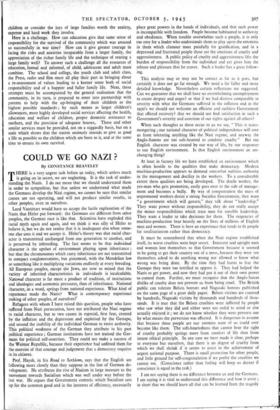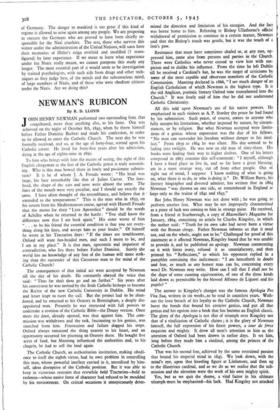COULD WE GO NAZI ?
By CONSTANCE REAVELEY
THERE is a very urgent task before us today, which unless much is going on in secret, we are neglecting. It is the task of under- standing the Nazis. I do not mean that we should understand them in order to sympathise, but that unless we understand what made the Germans develop the Nazi regime, we cannot be sure that similar causes are not operating, and will not produce similar results, in other peoples, even in ourselves.
Lord Vansittart would have us accept the facile explanation of the Nazis that Hitler put forward : the Germans are different from other peoples, the German race is like that. Scientists have exploded this racial myth again and again, and we think it was silly of Hitler to believe it, but we do not realise that it is inadequate also when some- one else uses it and we accept it. Hitler's theory was that racial char- acter is transmitted unchanged from one generation to another, and is preserved by inbreeding. The fact seems to be that individual character is the upshot of environment playing upon inheritance ; but that the chromosomes which carry inheritance are not transmitted in compact conglomerations, but piecemeal, with the Mendelian law or something like it multiplying variations endlessly at every breeding. All European peoples, except the Jews, are now so mixed that the variety of inherited characteristics in individuals is incalculable. National character is far more a product of tradition, of institutions and ideologies and economic pressures, than of inheritance. National character, in a word, springs from national experience. What kind of experience made the Nazis? What is contemporary experience making of other peoples, of ourselves?'
Refugees with whom I have raised this question, people who have suffered from Nazi persecution, have not attributed the Nazi regime to racial character, but to two causes in especial, first fear, created by the inflation and the. depression and exploited by the Gestapo, and second the inability of the individual German to resist authority. This political weakness of the German they attribute to his past political experience ; German institutions have not trained the Ger- mans for political self-assertion. They could not make a success of the Weimar Republic, because their experience had unfitted them for the exercise of that courage and judgement that a democracy requires in its citizens.
Prof. Hayek, in his Road to Serfdom, says that the English are following more closely than they suppose in the line of German de- velopment. He attributes the rise of Nazism in large measure to the movement towards Socialism which was well under way before the last war. He argues that Government controls which Socialism sets up for the common good and in the interests of efficiency, necessarily place great powers in the hands of individuals, and that such power is incompatible with freedom. People become habituated to authority and obedience. When trouble overwhelms such a people, it is only too easy for a leader who understands them to play upon the emotions in them which clamour most painfully for gratification, and in a depressed and frustrated people these are the emotions of cruelty and aggressiveness. A public policy of cruelty and aggressiveness lifts the burden of responsibility from the individual and yet gives him the release and pleasure that he craves. Such a leader has a great follow- ing.
This analysis may or may not be correct as far as it goes, but certainly it does not go far enough. We need a far fuller and more detailed knowledge. Nevertheless certain reflections are suggested. Can we guarantee that we shall have no overwhelming unemployment to create despair and anger? or that if we had distress comparable in severity with what the Germans suffered in the inflation and in the mo's we should not welcome an efficient and ruthless Government that offered recovery? that we should not find satisfaction in such a Government's severity and assertion of our rights against all others?
When such thoughts as these occur to us we say, " This is scare- mongering ; our national character of political independence will save us from tolerating anything like the Nazi regime, and anyway the Anglo-Saxons are too soft-hearted to condone cruelty " But our English character was created by our way of life, by our responses to our English environment. Is that English environment an un- changing thing?
At least in factory life we have established an environment which is often hostile to the qualities that make democracy. Modern machine-production appears to demand somewhat ruthless authority in the management and docility in the workers. To a considerable extent these qualities are being developed. The docile worker, the yes-man who gets promotion, easily goes over to the side of manage- ment and becomes a bully. By way of compensation the mass of unpromoted workers desire a strong Socialist Government, they want " a government which will govern," they talk about " leadership." They want power without responsibility, they do not really accept the minor responsibilities which train men for sensible leadership. They want a leader to take decisions for them. The exigencies of machine-production bear heavily on the lives of millions of English men and women. There is here an experience that tends to fit people for totalitarianism rather than democracy.
It must be remembered that when the Nazi regime established itself, its worst cruelties were kept secret. Innocent and upright men and women lent themselves to that Government because it seemed to be going to get their country out of a mess,.because they were not themselves asked to do" anything wrong nor allowed to know what wrong was being done. By the time they had learnt to fear the Gestapo they were too terrified to oppose it. They had helped the Nazis to get power, and now they had put it out of their own power to control them. Further, we must recognise that the Anglo-Saxon dislike of cruelty does not prevent us from being cruel. The British public can tolerate Belsen horrors and Nagasaki horrors published on the same page of a great daily paper. Belsen victims are counted by hundreds, Nagasaki victims by thousands and hundreds of thou- sands. It is true that the Belsen cruelties were inflicted by people who saw what they did and either were too stolid to mind or else actually enjoyed it ; we do not know whether they were perverts nor by what means the perversion was effected. It is dangerous to assume that because these people are our enemies none of us could ever become like them. The soft-heartedness that cannot bear the sight of cruelty probably springs more from comfort of life than from innate ethical principle. In any case we have made it clear, perhaps to everyone but ourselves, that there is no degree of cruelty from which we shall shrink if it seems to assist in the achievement of urgent national purpose. There is small protection for other people, and little ground for self-congratulation if we prefer the cruelties we cannot see. (Conscience rather than feeling will keep us decent if conscience is equal to the task.) I am not saying there is no difference between us and the Germans. I am saying it is vital to understand this difference and how it arose ; in short that we should learn all that can be learned from the tragedy of Germany. The danger to mankind is too great if this kind of regime is allowed to arise again among any people. We are proposing to execute the Germans who are proved to have been chiefly re- sponsible for the Nazi cruelties. The rest, those who survive this winter under the administration of the United Nations, will soon have their memories of Hitler's reign overlaid and modified (? trans- figured) by later experience. If we mean to learn what experience under the Nazis really meant, we cannot postpone this study any longer. The most essential part of it would seem to be investigation by trained psychologists, with such aids from drugs and other tech- niques as they judge best, of the minds and the subconscious mind, of large numbers of Nazis, and of those who were obedient citizens under the Nazis. Are we doing this?



























 Previous page
Previous page